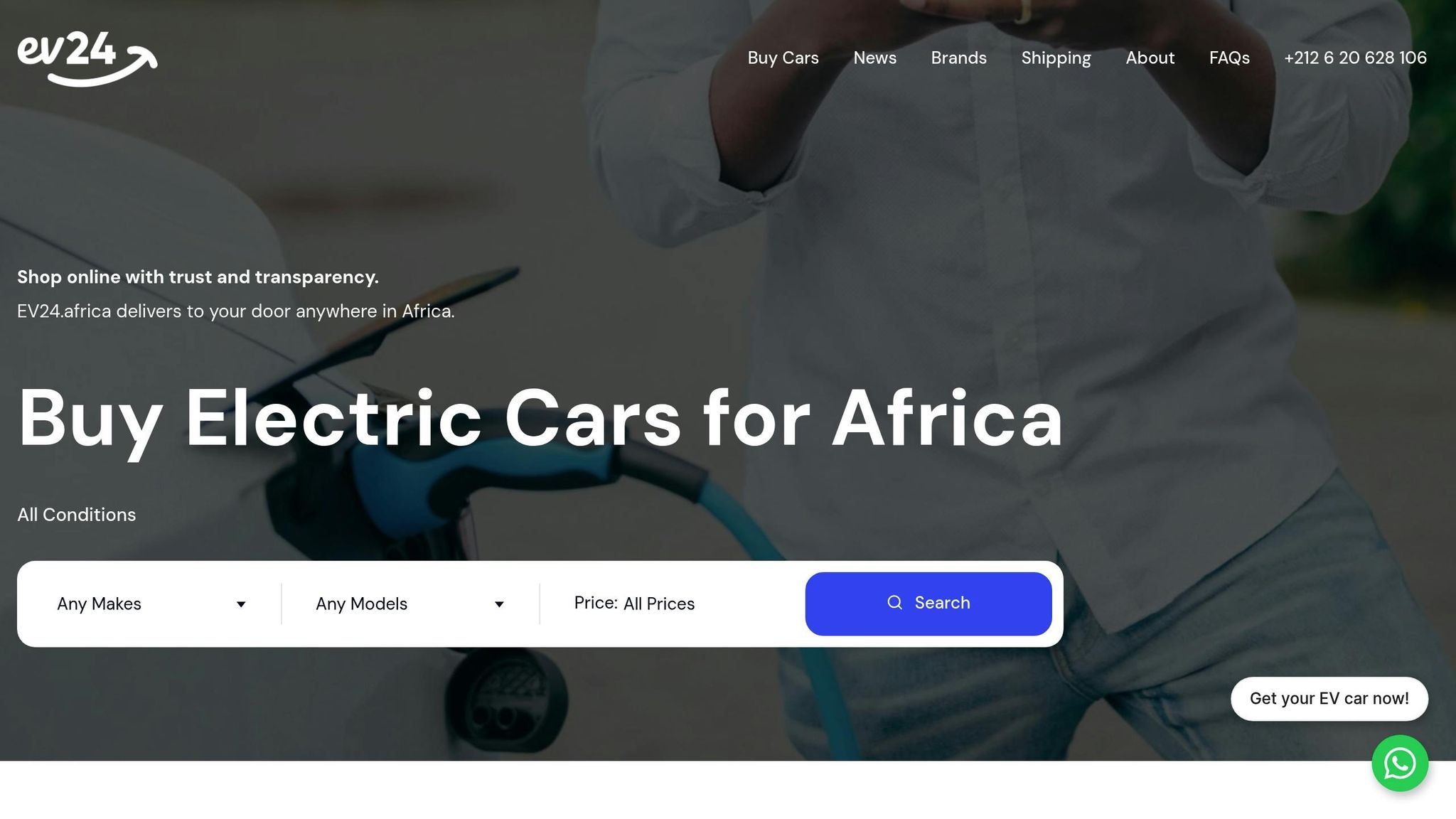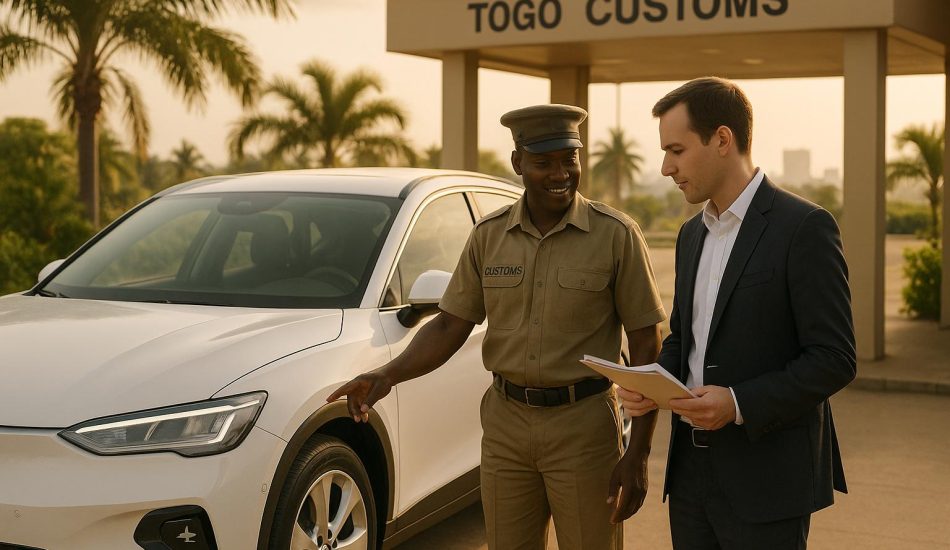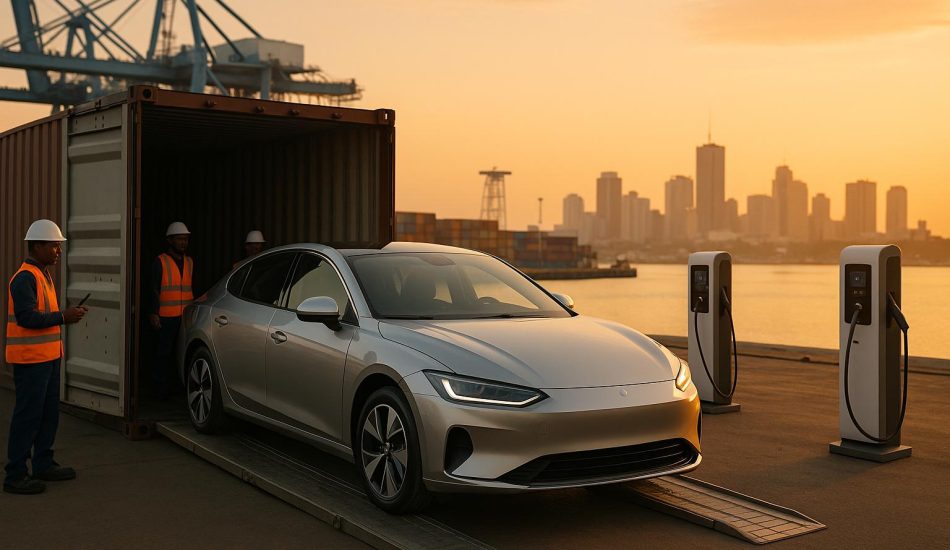
Ghana’s electric vehicle (EV) market is booming in 2025, driven by government incentives, reduced import costs, and growing consumer interest. Here’s what you need to know:
- Zero Import Duties: EVs enjoy an eight-year import duty waiver (until 2032), making them cheaper than traditional vehicles.
- Tax Exemptions: EVs for public transport are exempt from VAT under the amended VAT Act.
- Registration Process: Requires customs clearance, vehicle inspection, and documentation like the Import Declaration Form and Taxpayer ID.
- Charging Infrastructure: Over 100 rapid charging stations planned within five years to support EV growth.
- Types of EVs: Includes BEVs, PHEVs, HEVs, and electric two- and three-wheelers, catering to diverse needs.
- Customs Clearance: Managed via Ghana’s Integrated Customs Management System (ICUMS), requiring accurate documentation and prepayment of fees.
For a smoother import experience, platforms like EV24.africa simplify the process by managing compliance, customs, and delivery. With Ghana’s supportive policies and infrastructure plans, now is an ideal time to explore EV imports.
Ghana’s 2025 EV Tariffs and Tax Policies
Ghana has emerged as one of the most welcoming environments for electric vehicle (EV) imports in West Africa. Recent updates to its tax policies have significantly reduced import costs for both individual buyers and businesses. These changes set the stage for a closer look at import costs and comparisons between EVs and traditional vehicles.
Tariffs and Tax Exemptions Overview
In 2024, Ghana introduced a zero-duty policy for EV imports, waiving import duties for an eight-year period. This exemption applies to vehicles used for public transportation, as well as Semi-Knocked Down (SKD) and Completely Knocked Down (CKD) imports by registered EV assembly companies. This marks a departure from the standard ECOWAS Common External Tariffs, which typically range from 0% to 35% depending on the product category.
By adopting this policy, Ghana joins other African nations – such as Cape Verde, Ethiopia, Mauritius, Rwanda, Seychelles, Togo, Tunisia, and Zambia – that have reduced or eliminated import duties on EVs. The eight-year exemption, lasting until 2032, provides importers with a level of cost predictability. However, it’s worth noting that while duties are waived, other fees and levies still apply.
Additional Import Costs Breakdown
Beyond the zero-duty policy, importers still face several additional fees based on the Cost, Insurance, and Freight (CIF) value of the vehicle. These include:
- Value Added Tax (VAT): 12.5% of the duty-inclusive value.
- National Health Insurance Levy (NHIL): 2.5%.
- GETFund Levy: 2.5%.
- Other levies: African Union (0.2%), ECOWAS (0.5%), and EXIM (0.75%).
- Special Import Levy: 2%.
- Examination Fee: 1% for used vehicles.
Fixed costs, such as trade number plates priced at GH₵154 (around $10 USD), also apply. Additionally, local shipping, terminal handling, and clearing charges vary depending on the port of entry.
EV vs. Gas Vehicle Import Cost Comparison
The zero-duty policy gives electric vehicles a clear cost advantage over gasoline-powered vehicles, which are subject to import duties ranging from 5% to 20%, depending on engine size and vehicle type. These duties, combined with other fees, make EVs a more attractive option for importers.
Here’s a side-by-side comparison of the key cost components:
| Cost Component | Gasoline Vehicle | Electric Vehicle |
|---|---|---|
| Import Duty | 5% – 20% | 0% |
| VAT | 12.5% | 12.5% |
| NHIL | 2.5% | 2.5% |
| GETFund Levy | 2.5% | 2.5% |
| African Union Levy | 0.2% | 0.2% |
| ECOWAS Levy | 0.5% | 0.5% |
| EXIM Levy | 0.75% | 0.75% |
| Examination Fee (Used) | 1% | 1% |
| Special Import Levy | 2% | 2% |
The absence of import duties for EVs results in substantial savings, especially for high-value vehicles or bulk imports. This cost advantage positions EVs as a competitive alternative in Ghana’s automotive market, potentially accelerating their adoption.
EV Import Registration Process in Ghana
Once your imported electric vehicle (EV) clears customs and all fees are paid, the next step is to register it with the Ghanaian authorities. The Driver and Vehicle Licensing Authority (DVLA) has established a two-step registration process to ensure your EV is properly documented and road-ready.
Required Documentation Checklist
Before heading to the DVLA, make sure you have these essential documents:
- Original waybill or Bill of Lading: Proof of shipment and ownership transfer.
- Attested invoice: Indicates the vehicle’s purchase price and specifications.
- Packing list: Details the contents of the shipment.
- Import Declaration Form (IDF): Issued by the Ministry of Trade, authorizing the vehicle’s import.
- Taxpayer Identification Number (TIN) or GhanaCard PIN: Required for tax compliance.
- Regulatory permits: Any necessary approvals from agencies like the Food and Drugs Authority (FDA) or Ghana Standards Authority (GSA).
Having these documents ready will save you time and prevent unnecessary delays during the clearance and registration process.
Registration Process Steps
The DVLA registration process is divided into two key phases:
- Pre-Registration Phase: Take your EV, along with the customs documents, to an authorized Vehicle Testing Station or DVLA office. Here, officials will inspect the vehicle and verify its specifications.
- Final Registration Phase: Starting January 2, 2025, head to a DVLA office to complete the registration. This includes making payments, digitally capturing your biometric data, and receiving your registration documents. Through the Online Vehicle Registration System, you’ll be issued a Vehicle Registration Smart Card and a Certificate of Title. Your license plates will include a "-25" suffix, signifying the 2025 registration year.
Technical Compliance Requirements
Meeting technical standards is a critical part of the registration process. Ghana’s technical requirements for EVs are evolving as the country works to expand its EV market. The government is revising the Road Traffic Regulations, 2012 (L.I. 2180), to better address the needs of electric vehicles.
Ghana recognizes various EV categories, including Battery Electric Vehicles (BEVs), Hybrid Electric Vehicles (HEVs), and Plug-in Hybrid Electric Vehicles (PHEVs). These updates align with the National Electric Vehicle Policy, which seeks to lower transportation emissions and reduce reliance on fossil fuels.
EV Customs Clearance Process
After registering your electric vehicle (EV), the next critical step is clearing it through customs. In Ghana, this process is managed by the Ghana Revenue Authority (GRA) using the Integrated Customs Management System (ICUMS). While the system simplifies the process, it requires strict adherence to specific steps and documentation to avoid delays.
Customs Declaration and Inspection Process
The first step in customs clearance is submitting your cargo details through the UNIPASS-Ghana System. This electronic platform connects directly with ICUMS to handle import declarations. You’ll need to provide key details about your EV, such as the Chassis Number or Vehicle Identification Number (VIN), model, year, and make, to calculate duties through the system.
Customs officials will then verify your submitted documents and conduct a physical inspection of your vehicle. This inspection ensures that the vehicle matches the specifications in your paperwork. Officials will check the VIN, confirm the vehicle’s condition, and verify that the declared value aligns with their assessment.
As part of the process, the system automatically performs a risk assessment and quality assurance check to determine if additional inspections are necessary. Electric vehicles benefit from an eight-year duty exemption. Once the inspection and risk assessment are complete, you can proceed to pay any applicable fees.
How to Pay Duties and Fees
Although EVs are exempt from duties for eight years, other fees and taxes still apply. To expedite the process, duties can be prepaid using the Title and Bill of Lading before the vehicle arrives in Ghana. This advance payment option can significantly reduce clearance time.
Payments are processed through ICUMS after customs classification and valuation. Fees are calculated based on the first purchase price (manufacturer’s price at the time of production), with depreciation ranging from 0-50% depending on the vehicle’s age. The system also factors in the Free On Board (FOB) value, current exchange rates, freight, and insurance costs.
It’s important to note that no one is exempt from paying duties except the President, state institutions, and diplomatic missions. If these entities sell a vehicle to a private individual or company, duties must be paid before the ownership transfer is finalized.
Customs Clearance Documentation Checklist
Accurate and complete documentation is essential for smooth customs clearance. Missing or incorrect paperwork is one of the most common reasons for delays or penalties during the import process.
| Document | Purpose | Tips |
|---|---|---|
| Original Bill of Lading or Waybill | Confirms shipment ownership and shipping instructions | Use original documents, not copies; ensure vehicle details match exactly |
| Title | Proves legal ownership of the vehicle | Must be original; verify there are no liens or encumbrances |
| Attested Invoice | Provides purchase price and vehicle specifications | Ensure the invoice is notarized and the price is accurate for duty calculations |
| Packing List | Lists all shipment contents | Include all accessories and extra parts shipped with the vehicle |
| Import Declaration Form (IDF) | Authorizes import through the Ministry of Trade | Apply early to avoid delays; double-check vehicle type details |
| Tax Clearance Certificate (TCC) | Confirms tax compliance | Obtain a current and valid certificate from the GRA |
| Customs Classification and Valuation Report (CCVR) | Confirms the vehicle’s assessed value | Review for accuracy before proceeding |
| Validated Cargo Tracking Note (CTN) | Verifies shipping compliance | Ensure validation before the vehicle departs the origin country |
| Delivery Order | Authorizes cargo release | Issued after fees are paid and documents verified |
If you prefer to handle the process yourself, you can register as a GRA Clearing Agent. This requires submitting a written or electronic application to the Commissioner-General and completing the approval process.
To avoid delays, start the clearance process early and work closely with all relevant parties. Double-check every document for accuracy and ensure you’re using the correct Harmonized System (HS) codes for your EV. Proper preparation can save time and prevent unnecessary complications.
sbb-itb-99e19e3
How EV24.africa Simplifies EV Imports to Ghana

Navigating the process of importing an electric vehicle (EV) to Ghana can be overwhelming, but EV24.africa streamlines the entire journey. From sourcing the vehicle to handling customs and delivery, they bring everything together under one roof so buyers can focus on embracing the future of mobility.
"At EV24.africa, we simplify the process of importing and buying electric vehicles in Africa. Our expertise ensures a seamless, transparent, and stress-free experience, so you can focus on driving the future of mobility."
By consolidating all services into one platform, EV24.africa eliminates the hassle of dealing with multiple vendors. Whether it’s choosing a vehicle, arranging financing, or managing shipping and customs paperwork, everything is handled through one convenient point of contact.
Finding Electric Vehicles on EV24.africa
EV24.africa offers a carefully curated selection of EVs from top brands like Tesla, BYD, Hyundai, Leapmotor, ROX, Dongfeng, Geely, Toyota, and Suzuki. The platform sources vehicles from Europe, Asia, North America, and Japan, giving buyers access to a wide range of new and used options, including passenger cars and light commercial vehicles.
Each listing includes high-quality photos, verified vehicle histories, and detailed technical specs, helping buyers make informed decisions. Pricing is transparent, with upfront details about vehicle costs, shipping fees, and potential import charges to avoid surprises down the line.
A standout feature is the platform’s focus on compliance with Ghana’s import regulations. EV24.africa pre-screens vehicles to ensure they meet the country’s technical and regulatory requirements. This is especially important given reports of some importers being charged duties on EVs despite Ghana’s announced eight-year exemption. Compliance experts review all listings to minimize risks, and detailed information like Vehicle Identification Numbers (VINs) and technical certifications helps streamline customs processes, reducing delays.
Once buyers select their ideal EV, EV24.africa ensures a smooth transition with financing and shipping options that simplify the journey from selection to delivery.
Financing, Shipping, and Delivery Services
To make EV ownership more accessible, EV24.africa partners with financial institutions to provide flexible financing options, including installment plans and vehicle loans. These solutions are tailored for both personal and business buyers, making it easier to afford newer models or expand commercial fleets.
The platform also offers clear pricing that includes local taxes and import fees, helping buyers understand the total cost of ownership upfront. This transparency is particularly useful for Ghanaian customers navigating the financial aspects of EV imports.
When it comes to shipping, EV24.africa manages everything – from international freight to final delivery. Buyers can choose between Roll-on/Roll-off (RoRo) and container shipping, depending on their budget, the condition of the vehicle, and how quickly they need it delivered. Deliveries are routed through the Port of Tema, with options for port-to-port or door-to-door service. Real-time tracking updates and dedicated logistics support ensure peace of mind throughout the process. All shipping operations follow Incoterms standards, clarifying responsibilities and risks during transit.
Expert Support for Compliance and Cost Savings
EV24.africa employs a team of specialists who stay well-informed about Ghana’s evolving import policies and tariff structures. These experts guide buyers through the eight-year zero-duty exemption for EVs, ensuring they take full advantage of government incentives.
The platform provides a detailed documentation checklist tailored to Ghana’s requirements, including customs forms, technical compliance certificates, and proof of purchase. This guidance is invaluable given the complexities and inconsistencies sometimes associated with Ghana’s EV import policies.
Additionally, EV24.africa ensures vehicles meet Ghana’s safety, emissions, and charging standards. Their specialists assist with pre-import inspections and help resolve compliance issues during customs clearance, reducing the risk of delays or unexpected penalties.
Key Takeaways for EV Importers in Ghana
Bringing an electric vehicle (EV) into Ghana in 2025 requires a clear understanding of tariffs, registration processes, and customs clearance. Each of these steps can directly affect both the cost and timeline of your import, so careful preparation is essential to ensure a smooth experience.
Ghana’s EV policies offer considerable financial advantages. For instance, there’s an eight-year import duty waiver for electric vehicles used in public transportation, which can significantly reduce costs compared to gasoline vehicles. However, to benefit from this waiver, importers must stay updated on regulations. The Ghana Revenue Authority (GRA) will confirm eligibility during customs clearance, ensuring the vehicles are registered with the Ghana Driver Vehicle and Licensing Authority (DVLA) specifically for public transportation.
Proper documentation and prepayment of duties in advance are key to avoiding delays during customs clearance. Given Ghana’s ambitious EV adoption goals, being well-prepared can save both time and money.
"The Ministry views transport electrification as both an environmental imperative and an economic opportunity to develop cutting-edge manufacturing capabilities." – Director Seth A. Mahu, Ministry of Energy and Green Transition
To simplify this process, companies like EV24.africa offer services that help importers navigate regulatory and procedural hurdles. They pre-screen vehicles for compliance, manage customs clearance, and oversee delivery, ensuring the entire process runs smoothly. Their comprehensive approach helps importers avoid unexpected fees and delays while adhering to the required duty waiver and documentation standards.
FAQs
What are the steps for clearing customs when importing an electric vehicle into Ghana, and how can I make the process easier?
Clearing an electric vehicle (EV) through customs in Ghana involves a series of important steps. These include submitting cargo details via the UNIPASS-Ghana System, verifying the required documents, undergoing system validation, classifying and valuing the cargo, performing a risk assessment, and paying the necessary duties and taxes. Each step ensures compliance with Ghana’s import regulations.
To simplify the process, consider hiring a licensed customs broker to manage the paperwork and procedures. Make sure you have all the required documents ready, such as the bill of lading, invoice, and proof of payment. It’s also worth noting that EVs in Ghana benefit from zero import duties until 2032, so staying updated on exemptions and tariffs can be a big advantage. With proper planning and professional help, you can save time and avoid unnecessary delays.
How does Ghana’s eight-year import duty waiver for electric vehicles lower the cost compared to importing gasoline cars?
Ghana’s Import Duty Waiver for EVs
Ghana has introduced an eight-year import duty waiver for electric vehicles (EVs), effectively removing import taxes on these vehicles. This policy significantly lowers the cost of bringing EVs into the country, making them more affordable upfront when compared to gasoline-powered cars, which still carry standard import duties.
Thanks to this waiver, the price of EVs can be 13–15% lower than that of traditional gasoline vehicles. This reduction not only makes EVs a more budget-friendly choice for individuals and businesses but also promotes their adoption. Additionally, the policy helps cut long-term ownership expenses, offering a practical alternative to conventional cars.
What documents do I need to register an imported electric vehicle with Ghana’s DVLA?
To get your imported electric vehicle registered with the Ghana Driver and Vehicle Licensing Authority (DVLA), you’ll need to gather the following paperwork:
- Original customs entry documents: These confirm that the vehicle has successfully cleared customs.
- Proof of purchase: This could be an invoice or receipt showing you bought the vehicle.
- A valid ID document: Examples include your passport or national ID.
- Certificate of origin: Required for new vehicles or equivalent paperwork.
Double-check that all your documents are accurate and complete to keep the registration process smooth and hassle-free.




